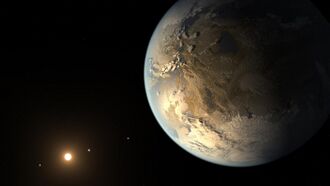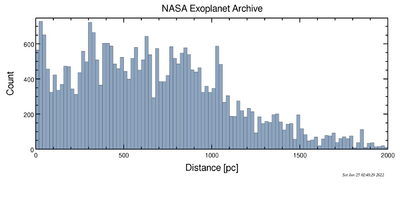Lists of planets
Topic: Astronomy
 From HandWiki - Reading time: 8 min
From HandWiki - Reading time: 8 min
These are lists of planets. A planet is a large, rounded astronomical body that is neither a star nor its remnant. The best available theory of planet formation is the nebular hypothesis, which posits that an interstellar cloud collapses out of a nebula to create a young protostar orbited by a protoplanetary disk. There are eight planets within the Solar System; planets outside of the solar system are also known as exoplanets.

As of 1 January 2020, there are 4,160 confirmed exoplanets in 3,090 systems, with 676 systems having more than one planet.[1] Most of these were discovered by the Kepler space telescope. There are an additional 1,979 potential exoplanets from Kepler's first mission yet to be confirmed, as well as 976 from its "Second Light" mission and 4,641 from the Transiting Exoplanet Survey Satellite (TESS) mission.[2]
In the Solar System
- For a list of geophysical planets in the Solar System, see: List of gravitationally rounded objects of the Solar System This also includes a list of the eight planets according to the IAU definition.
- For a list of objects in the Solar System once but no longer generally considered planets, see: List of former planets
- For a list of objects in the Solar System, including planets, that have been or are believed to exist, but either have not been proven or have been disproven, see: List of hypothetical Solar System objects
Outside the Solar System

<section begin=fullList />
- List of directly imaged exoplanets
- List of exoplanet extremes
- List of exoplanet firsts
- List of exoplanets discovered by the Kepler space telescope
- List of exoplanets observed during Kepler's K2 mission
- List of extrasolar candidates for liquid water
- List of terrestrial exoplanet candidates for atmosphere detection
- List of hottest exoplanets
- List of coolest exoplanets
- List of multiplanetary systems
- List of circumbinary planets
- List of nearest exoplanets
- List of nearest terrestrial exoplanet candidates
- List of potentially habitable exoplanets
- List of proper names of exoplanets
- List of largest exoplanets
- List of smallest exoplanets
- List of transiting exoplanets
- List of exoplanets and planetary debris around white dwarfs
- List of extrasolar planetary collisions
Lists of exoplanets by year of discovery
- List of exoplanets discovered before 2000 (Script error: No such module "Table row counter".)
- List of exoplanets discovered between 2000–2009 (Script error: No such module "Table row counter".)
- List of exoplanets discovered in 2010 (Script error: No such module "Table row counter".)
- List of exoplanets discovered in 2011 (Script error: No such module "Table row counter".)
- List of exoplanets discovered in 2012 (Script error: No such module "Table row counter".)
- List of exoplanets discovered in 2013 (Script error: No such module "Table row counter".)
- List of exoplanets discovered in 2014 (Script error: No such module "Table row counter".)
- List of exoplanets discovered in 2015 (Script error: No such module "Table row counter".)
- List of exoplanets discovered in 2016 (Script error: No such module "Table row counter".)
- List of exoplanets discovered in 2017 (Script error: No such module "Table row counter".)
- List of exoplanets discovered in 2018 (Script error: No such module "Table row counter".)
- List of exoplanets discovered in 2019 (Script error: No such module "Table row counter".)
- List of exoplanets discovered in 2020 (Script error: No such module "Table row counter".)
- List of exoplanets discovered in 2021 (Script error: No such module "Table row counter".)
- List of exoplanets discovered in 2022 (Script error: No such module "Table row counter".)
- List of exoplanets discovered in 2023 (Script error: No such module "Table row counter".)
- List of exoplanets discovered in 2024 (Script error: No such module "Table row counter".)
- List of exoplanets discovered in 2025 (Script error: No such module "Table row counter".)
<section end=fullList />
- Extrasolar systems
- List of multiplanetary systems
- List of exoplanets discovered using the Kepler space telescope
- List of stars with proplyds
- List of rogue planets
- Exoplanets by method of detection
- List of exoplanets detected by radial velocity
- List of transiting exoplanets
- List of exoplanets detected by microlensing
- List of exoplanets discovered via astrometry
- List of directly imaged exoplanets
- List of exoplanets detected by timing
- Records in exoplanet detection
- Potential terrestrial exoplanets
Fictional or non-scientific planets
- For a list of planets as used in astrology, see: Planets in astrology
- For a list of supposed planets not based on scientific evidence, see: Planetary objects proposed in religion, astrology, ufology and pseudoscience
- For lists of planets in fiction, see: Fictional planets of the Solar System, Extrasolar planets in fiction § List, and List of Star Wars planets and moons
Mixed
- List of planet types (etymologically accepting of multiple categories)
See also
- Lists of astronomical objects
- Classical planet
- Definition of planet
- List of exoplanet search projects
References
- ↑ Schneider, J.. "Interactive Extra-solar Planets Catalog". The Extrasolar Planets Encyclopedia. http://exoplanet.eu/catalog.php. Retrieved 1 January 2020.
- ↑ 2.0 2.1 "Exoplanet and Candidate Statistics" (in en). NASA Exoplanet Science Institute. https://exoplanetarchive.ipac.caltech.edu/docs/counts_detail.html.
External links
- The NASA Exoplanet Archive
- The Extrasolar Planet Encyclopaedia — Catalog Listing accessed in 2015-09-28
- Exoplanet Data Explorer accessed in 2015-09-28
- "Open Exoplanets Catalogue". http://www.openexoplanetcatalogue.com/.
- Wright, J. T.; Fakhouri, O.; Marcy, G. W.; Han, E.; Feng, Y.; Johnson, John Asher; Howard, A. W.; Fischer, D. A. et al. (2011-04-01). "The Exoplanet Orbit Database". Publications of the Astronomical Society of the Pacific 123 (902): 412–422. doi:10.1086/659427. ISSN 0004-6280. Bibcode: 2011PASP..123..412W.
| |
This article includes an astronomy-related list of lists. |
 |
 KSF
KSF



